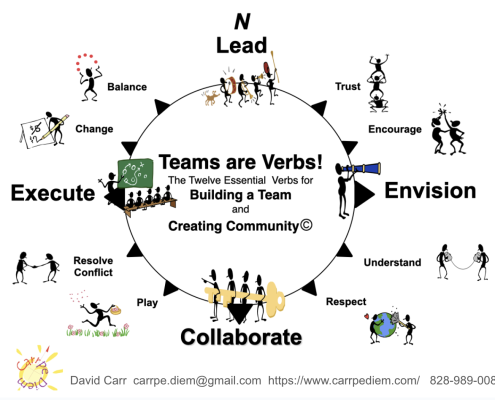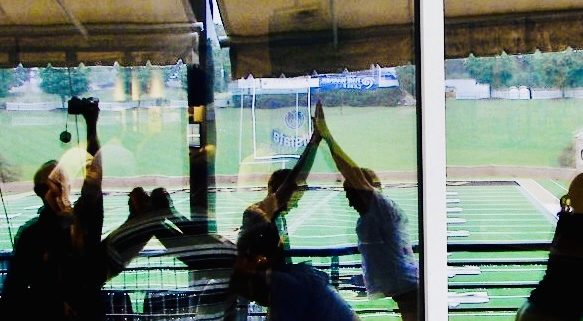Are You Trustworthy? What Is Your Evidence?
 In my Teams Are Verbs© circle, trust is among the twelve essential verbs for creating a team and building a community. Everything begins with trust, including relationships, processes, operations, performance, and strategic plans. Trust has always been the opening conversation in any organizational development program or retreat I facilitate. Trust is my first conversation in leadership coaching, beginning with two essential questions: Are you trustworthy? What is your evidence?
In my Teams Are Verbs© circle, trust is among the twelve essential verbs for creating a team and building a community. Everything begins with trust, including relationships, processes, operations, performance, and strategic plans. Trust has always been the opening conversation in any organizational development program or retreat I facilitate. Trust is my first conversation in leadership coaching, beginning with two essential questions: Are you trustworthy? What is your evidence?
Conflict, indifference, ugly behavior, and fear are the root of distrust. Distrust kills collaboration and cooperation and destroys teams and communities.
Building trust, maintaining trust, and repairing trust when broken should be a lifestyle and fundamental habit. The work of and on trust relates to one’s emotional intelligence, including self-awareness, self-management, empathy, and social skills.
In Charles Feltman’s The Thin Book of Trust: An Essential Primer for Building Trust at Work, Third Edition, he updates the four trust assessments: Care, Sincerity, Reliability, and Competence. By being mindful and practicing these four assessments, trust becomes a competency, a set of skills that can be learned and improved. There is a link to a new study guide PDF that you can download.
“Trust is choosing to risk making something you value vulnerable to another person’s actions.” page 4
Consider Feltman’s four opening questions on trust:
1. What are your core beliefs about trust?
2. On a scale of 1 – 10, how trustworthy do you think you are?
3. How do you decide to trust people in your life and work?
4. What would lead you to distrust someone?
Care is the most critical trust assessment. “People don’t care how much you know until they know how much you care.”—Theodore Roosevelt. Care requires vulnerability, Care about the values, concerns, hopes, and dreams, care to understand before being understood, and care about the growth and development of others.
Sincerity is the second trust assessment. It begins with knowing your core values and principles. Do you walk your talk? Do you hold yourself accountable to them? Sincerity requires consistency. It also seeks feedback from others on how they are experiencing you.
Reliability is the third trust assessment. It is about keeping commitments. It requires understanding the language of requests, offers, and commitments. Know the difference between direct requests, indirect requests, and drive-by requests. Feltman delves into the Cycle of Commitment, its key components, and its importance.
Competence is the final trust assessment: skills, ability, and knowledge to act effectively within a specific domain. Being competent is not about being perfect. It requires being honest with yourself and others and asking for help where you are incompetent.
Feltman sites studies on mistrust and distrust in the workplace have the most significant economic impact on an organization. Organizations were substantially more profitable where there was behavioral integrity – reliability, and sincerity. Trust had a more significant effect on profit than employee satisfaction and commitment. “In organizations where employees believe their managers trustworthy, everyone was a beneficiary.” (Page 60)
“Mistrust doubles the cost of doing business.” – John O. Whitney, Professor, Columbia Business School
What do you do if you betray someone’s trust? Acknowledge and apologize. What we resist persists.
Don’t take an apology lightly. Suggest watching V’s (formerly Eve Ensler) TED Talk, The Profound Power of an Authentic Apology. V says there are four components to an authentic apology:
1.) Recount the event in detail. There is liberation in the details.
2.) Give the reason why. The injured are haunted by the why.
3.) Open your heart. Have empathy. Feel what the injured feel.
4.) Take responsibility and try to make amends. It’s the only way to set the injured and yourself free.
We teach our children many things, many skills, and many processes. We emphasize practice. We don’t teach our children about trust or apology. We assume that trust and apology are a given and learned by osmosis. This work calls for attention, understanding, and practice. After all, everything begins with trust.







